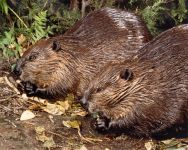


|

|
|
 
|
Although the Refuge charter did not address the issue of veganism, it has become clear that this is a pivotal issue. We recognize that being a vegan because one is concerned about others who share this planet with us extends beyond just dietary choices. It governs everything we do, all the choices we make each day, in order to minimize our negative impact on all animals. We also have learned that a vegan diet and choice of clothing are superior, not only because of the direct impact on other animals, but also because of the detrimental effects that animal-based food and fiber have on the environment and all who inhabit this earth. In addition to the suffering and death inflicted on the animals raised for human consumption, there are other issues such as air and water pollution, destruction of wildlife to 'protect livestock', destruction of habitat due to 'livestock' grazing and so forth. The video on the right exemplifies why veganism is critical for you, other animals and our planet. If for some reason your browser is not properly displaying the video, you can click here to get direct access.
The Refuge co-founders first faced this issue when patrolling their newly acquired land to keep out hunters. They asked one hunter they encountered why he chose to hunt and kill animals. He replied by asking if they ate cows or chickens. When they answered truthfully that they did, the hunter said that the deer and quail he killed were his 'cows and chickens'. This exchange was one of the important experiences that made the co-founders realize that personal choices in food and fiber were critical to not only being ethically consistent on a personal level, but also in being credible to those who exploited and killed animals for any purpose regardless of species. They asked themselves the question of why a cow's life was any less important than that of the deer they were protecting and found the answer to be exceedingly simple: life and being able to pursue one's interests were equally important to the individual regardless of species. They realized that one cannot effectively advocate for the protection of wildlife without also refraining from exploiting animals, not only those who are held in captivity to provide food and fiber for people, but also in all areas of human activity. They discontinued eating animals and soon thereafter embraced veganism as a way of life.
Some may ask whether vegetarianism – abstaining from eating the bodies of animals, but consuming their secretions or reproductive products – is acceptable for those who do not want to exploit any animal. The argument is that one does not have to kill cows to get milk or chickens to get eggs. Although this is technically true, it is not true in practice. In order for cows to produce milk, a cow has to produce a calf or be given artificial injections of hormones. She is also genetically modified through selective breeding to produce substantially more milk than is normal, resulting in continual problems of mastitis (inflammation of the udder) and metabolic disease. In the case of calves, roughly half are males and are of no use to the dairy industry; they are killed within a few days or weeks of birth. Because only a finite number of females are needed as 'replacements' for the herd, the 'excess' also are killed. Even if calves were not the issue, however, at some point a cow – who can live for 15 or more years – becomes uneconomical to the farmer and she is then killed. Currently, this 'cull' age is around six to eight years on most large commercial entities. The reality is that one cannot produce milk economically without unavoidable animal suffering and purposeful killing.
The same general issues surround the production of eggs. The vast majority of chickens used for eggs are kept in extreme artificial confinement and privation. Even if the chickens were allowed more room and some natural conditions – so-called 'free range' – there is still the issue of economics and productivity. Chickens can easily live for ten or more years. In commercial production, however, they are killed after one to two years of age, even if 'free range', because the cost of keeping them alive is more than the income generated by the eggs they produce. Simply put, there is no way to produce eggs on a commercial level without killing chickens.
Similar issues of death, suffering, treatment as economic 'units' and so forth are integral to every situation in which animals or products made from them are used for human consumption, including bees used for honey, silkworms for clothing and many others. There is no question that vegetarianism, although a comfortable stopping point for many people, is insufficient if animal suffering and exploitation are important to a person.
Finally, there is the issue of plants and how veganism impacts on them. We are often challenged with the argument that plants may feel pain and suffer and that we are being cruel by eating them. This is nonsensical for several reasons. Plants do not appear to have an anatomy which would subserve pain or suffering. Furthermore, plants often reproduce by the very act of having parts of them eaten – for example, seed-bearing fruits and vegetables – making this consumption in their interests, something which is clearly not the case with animals. Plants can also have parts of them eaten without being killed – fruits, nuts, leafy plants and so forth. Nevertheless, we acknowledge that it appears axiomatic that continued life depends on the exploitation or death of others. Animals, however, are inefficient in converting plants into protein which is then eaten by others (meat, eggs, milk, etc.). It is, therefore, unquestionable that even if plants did suffer, those who eat animals must necessarily be responsible for the death and suffering of more plants than those who eat only plants.